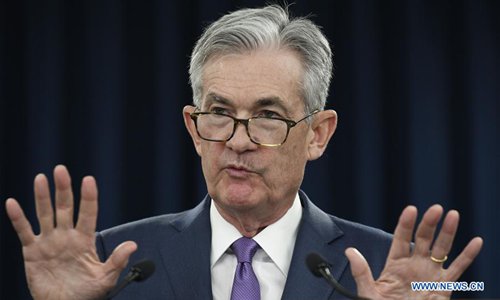HOME >> WORLD
US Fed cuts interest rates for first time since 2008
Source:Xinhua Published: 2019/8/1 10:38:08

US Federal Reserve Chairman Jerome Powell speaks during a press conference in Washington D.C., the United States, on July 31, 2019. US Federal Reserve on Wednesday lowered interest rates for the first time since the 2008 global financial crisis, amid rising concerns over trade tensions, a slowing global economy and muted inflation pressures. The Federal Open Market Committee, the Fed's rate-setting body, trimmed the target for the federal funds rate by 25 basis points to a range of 2 percent to 2.25 percent after concluding its two-day policy meeting, in line with market expectation. (Xinhua/Liu Jie)
US Federal Reserve on Wednesday lowered interest rates for the first time since the 2008 global financial crisis, amid rising concerns over trade tensions, a slowing global economy and muted inflation pressures.
The Federal Open Market Committee (FOMC), the Fed's rate-setting body, trimmed the target for the federal funds rate by 25 basis points to a range of 2 percent to 2.25 percent after concluding its two-day policy meeting, in line with market expectation.
"Through the course of the year, weak global growth, trade policy uncertainty, and muted inflation have prompted the FOMC to adjust its assessment of the appropriate path of interest rates," Fed Chairman Jerome Powell said at a press conference Wednesday afternoon.
Despite strong job growth and solid consumer spending, the central bank chief pointed out that manufacturing output has declined for two consecutive quarters, business fixed investment fell in the second quarter, and domestic inflation shortfall has continued.
"The Committee moved from expecting rate increases this year, to a patient stance about any changes, and then to today's action," Powell said.
"It's primarily about risk management and a recalibration in response to rising risks associated with global growth and trade tensions," Tim Duy, professor at the University of Oregon and a Fed expert, wrote in a Bloomberg opinion piece earlier this week.
Joseph Gagnon, senior fellow at the Peterson Institute for International Economics, told Xinhua in a recent interview that he thinks the Fed regrets its last two hikes last year and "kind of want to chase it back basically," adding that there may be another cut before the end of the year.
Calling it a "mid-cycle adjustment" to the central bank's monetary policy, Powell said the rate cut is "not the beginning of a long series of rate cuts."
The Fed approved four rate hikes in 2018, continuing a move toward policy normalization that began in 2015, after holding rates near zero for seven years. Since the beginning of this year, the central bank has left interest rates unchanged.
RELATED ARTICLES:
Posted in: AMERICAS